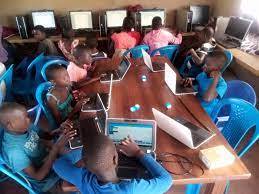Education: Commissioner calls for contextualising STEM in Nigeria


IBADAN (Sundiata Post) – The Ogun State Commissioner for Education, Prof. Abayomi Arigbabu, has underscored the need to contextualise Science, Technology, Engineering and Mathematics (STEM) education in Nigerian schools.
Arigbabu stated this at the Valedictory and 70th birthday of the former Dean, Faculty of Education, University of Ibadan, Prof. Mojeed Akinsola in Ibadan on Tuesday.
Arigbabu commended Prof. Akinsola and described him as a dedicated and invaluable academic who has contributed tirelessly to the educational sector in Nigeria.
He advocated for a more contextualised approach to STEM education in Nigeria to boost students’ engagement, learning outcomes and national development.
According to him, increasing evidence showed that students understand mathematical and scientific concepts better when lessons are connected to real-life experiences.
Arigbabu said that teaching maths through scenarios like market trade or farming helps students relate better to what they learn in class.
“There are five strategic priorities to improve STEM education nationwide: curriculum redesign, teacher training, community and industry partnerships, infrastructure, and policy implementation.
“The Nigerian Educational Research and Development Council (NERDC) needs to lead a participatory curriculum review that reflects both local realities and global trends,” he said.
The commissioner also called for investment in teachers’ capacity building, digital tools, mobile labs and local language instruction, especially in underserved regions.
He said that recent data from the National Bureau of Statistics showed that only 18 per cent of secondary schools in Nigeria have functional computer labs.
Arigbabu also said that over 17 million children aged five to 14 remain out of school.
He warned that without deliberate efforts, many students would continue to view STEM as abstract and irrelevant.
“The use of indigenous languages, collaborative projects, storytelling and field trips were also identified as effective ways to improve comprehension and retention,” the commissioner said.
Also, Prof. Akinsola, who also delivered a lecture titled: “Navigating Through Life: Reminiscence of a Mathematics Educator” attributed his success to God and the role of family members.
Akinsola emphasised that students must take active role in their own education while the government must fulfil its duty to provide equitable access to quality learning for all citizens.
The don advised students to be active participants rather than passive recipients in the learning process.
“They are expected to set goals, ask questions, work collaboratively, and reflect on their progress to improve outcomes.
“Students must take ownership of their learning journey, manage their time, stay organised, and maintain a positive mindset.
“Learning is a gift, a skill, and a choice,” Akinsola said.
According to him, students’ beliefs and perceptions about themselves significantly affect their academic success and well-being.
On the role of government, the don stated that education is a core social responsibility that should not be overlooked.
“Beyond national security and infrastructure, the government must ensure citizens have access to quality education, which is crucial for social and economic development.
“Governments are responsible for creating policies, funding education, and ensuring accountability to empower future generations,” Akinsola said.
Earlier, the Vice Chancellor, University of Ibadan, Prof. Kayode Adebowale, represented by the Deputy Vice Chancellor, Prof. Peter Olapegba, lauded the contributions of Prof. Akinsola in academics and service to the university.
“He was instrumental to so much progress in the UI.
“Also, he diligently carried out any assignments given to him while he was also active in ASUU,” Adebowale said. (NAN)









